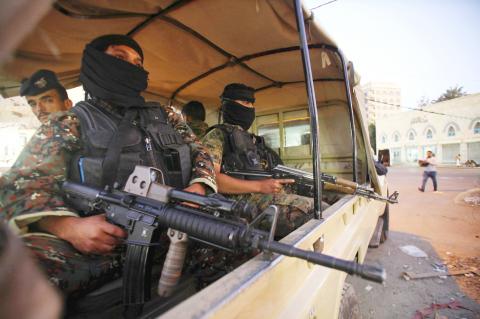Yemen’s powerful Shiite rebels announced on Friday that they have taken over the country and dissolved parliament, a dramatic move that finalizes their months-long power grab.
The development also pushes the impoverished country further into chaos and threatens to turn the political power struggle into a full-blown civil and sectarian conflict, pitting Houthi Shiites against the country’s majority Sunnis.
It could also play into the hands of Yemen’s al-Qaeda branch, the world’s most dangerous offshoot of the terror group, and jeopardize US counter-terrorism operations in the country.

Photo: Reuters
The declaration was read out by a TV announcer who said the move marked “a new era that will take Yemen to safe shores.”
It was televised to the nation on the rebels’ television network, al-Masseria TV.
An audience of hundreds of supporters, including former officials, at the Republican Palace in the capital, Sana’a, clapped furiously, while later, Houthi supporters took to the streets to celebrate, setting off fireworks.
The takeover statement named the Houthis’ security and intelligence arm, known as the “Revolutionary Committee,” as the ruling body of Yemen.
The takeover was followed by an explosion yesterday outside the Houthi-controlled presidential palace in Sana’a, wounding a policeman and a civilian, witnesses said.
The impoverished Arabian Peninsula country has teetered on the brink of fragmentation for the past year, but the crisis took a turn for the worse in September last year, when the Houthis took control of Sana’a after descending from their northern stronghold and fighting their way into central Yemen, seizing several other cities and towns along the way.
Their rising dominance forced Yemeni president Abed Rabbo Mansour Hadi and all Cabinet members to submit their resignations last month.
Since then, Hadi and the ministers have been under house arrest. The rebels issued a deadline, which expired on Wednesday, for Yemen’s political parties to negotiate what they called a way forward, warning that if there was no resolution, they would act unilaterally.
The Houthis also said that the “Revolutionary Committee” would act as the country’s government. The committee would also be tasked with forming a new parliament with 551 members.
The takeover comes after days of failed talks sponsored by the UN envoy to Yemen.
A former member of the Houthis’ political arm, Ansar Allah, described the takeover as “madness” and a “horror movie” that would result in Yemen’s collapse.
“Goodbye Yemen,” Ali al-Bukhiti wrote on his official Facebook page.
Additional reporting by AP and Reuters

AGING: As of last month, people aged 65 or older accounted for 20.06 percent of the total population and the number of couples who got married fell by 18,685 from 2024 Taiwan has surpassed South Korea as the country least willing to have children, with an annual crude birthrate of 4.62 per 1,000 people, Ministry of the Interior data showed yesterday. The nation was previously ranked the second-lowest country in terms of total fertility rate, or the average number of children a woman has in her lifetime. However, South Korea’s fertility rate began to recover from 2023, with total fertility rate rising from 0.72 and estimated to reach 0.82 to 0.85 by last year, and the crude birthrate projected at 6.7 per 1,000 people. Japan’s crude birthrate was projected to fall below six,

Conflict with Taiwan could leave China with “massive economic disruption, catastrophic military losses, significant social unrest, and devastating sanctions,” a US think tank said in a report released on Monday. The German Marshall Fund released a report titled If China Attacks Taiwan: The Consequences for China of “Minor Conflict” and “Major War” Scenarios. The report details the “massive” economic, military, social and international costs to China in the event of a minor conflict or major war with Taiwan, estimating that the Chinese People’s Liberation Army (PLA) could sustain losses of more than half of its active-duty ground forces, including 100,000 troops. Understanding Chinese

SELF-DEFENSE: Tokyo has accelerated its spending goal and its defense minister said the nation needs to discuss whether it should develop nuclear-powered submarines China is ramping up objections to what it sees as Japan’s desire to acquire nuclear weapons, despite Tokyo’s longstanding renunciation of such arms, deepening another fissure in the two neighbors’ increasingly tense ties. In what appears to be a concerted effort, China’s foreign and defense ministries issued statements on Thursday condemning alleged remilitarism efforts by Tokyo. The remarks came as two of the country’s top think tanks jointly issued a 29-page report framing actions by “right-wing forces” in Japan as posing a “serious threat” to world peace. While that report did not define “right-wing forces,” the Chinese Ministry of Foreign Affairs was

US President Donald Trump in an interview with the New York Times published on Thursday said that “it’s up to” Chinese President Xi Jinping (習近平) what China does on Taiwan, but that he would be “very unhappy” with a change in the “status quo.” “He [Xi] considers it to be a part of China, and that’s up to him what he’s going to be doing, but I’ve expressed to him that I would be very unhappy if he did that, and I don’t think he’ll do that. I hope he doesn’t do that,” Trump said. Trump made the comments in the context